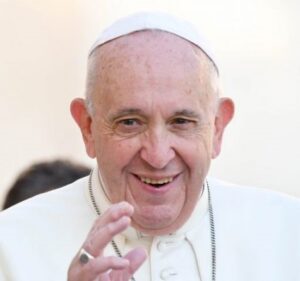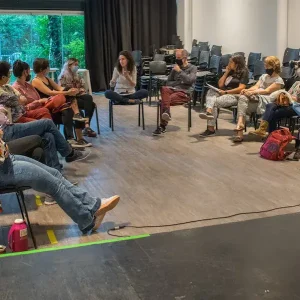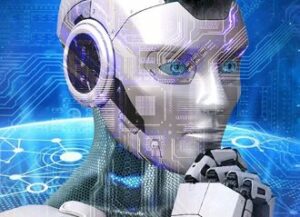06.04.2024
Source: CITTÀ NUOVA
Interview with Marcelle Momha, Cameroonian technology policy analyst
 Foto Pexels
Foto Pexels
There are many proposals that emerged from the last Synod on synodality. Pope Francis wants to examine 10 of them in particular:, “Mission in the Digital Environment” is among them. Marcelle Momha, a young Cameroonian living in the United States, is a technology policy and research analyst specializing in Artificial Intelligence (AI), emerging technologies and cyber security.

The Synod considers the digital sphere as a “crucial dimension of the Church’s witness in contemporary culture.” What does this mean for you?
Understanding digital culture as part of evangelization and engaging the younger generations of the Church in carrying out this mission is crucial. In relation to my personal research and work, in my own small way, I clearly understand that in the perspective of the “Synodal Church: communion, participation and mission,” Artificial Intelligence Literacy is now an essential component of broader digital literacy. In an era of rapid technological change, AI has emerged as one of the most powerful tools with the potential to transform societies. The advantages and benefits of this tool are immense. However, its ethical implications remain a subject of intense debate. I have recently joined a vibrant community of business leaders, data scientists, technical builders and cutting-edge researchers dedicated to harnessing the transformative power of AI for the benefit of humanity while minimizing its potential negative impact. I am contributing to the development of a Responsible IA Toolkit, a practical guide for incorporating six key pillars into the fabric of AI projects and operations: transparency, equity, accountability, privacy, sustainability, safety and security. As a Christian, this effort is an integral part of my commitment to reconcile and embed values in technology. I feel syntonic with the synod synthesis report and am deeply grateful to the Holy Spirit for guiding the Church throughout historical periods. As a young woman involved in these issues, this earnest call could not be timelier: today, the digital space is integral part of our mission’s life.
Synod proposes a discernment of how to be involved in helping to make the online world “safe,” highlighting the dangers of intimidation, misinformation, exclusion and exploitation.
Thus, under-resourced communities cannot participate, cannot bring their know-how, their gifts, to the table. How can they feel they are sent on a mission?
It is essential that AI, like any other technology, becomes more inclusive, accurately expresses and
embraces the diversity of people, cultures and opinions across the world.
There is also much discussion around the potential threats that AI poses to Global Peace and Human
Development. Pope Francis spoke about this in his latest message on World Peace Day, January 1,
2024. I firmly believe that there should be a dual approach, top-down and bottom-up, to address
those concerns. In addition to the adoption of national and international governance strategies,
corporate engagement, regulatory frameworks, norms and standards, there should be a significant
investment in AI Literacy and Education.
As I mentioned earlier, AI applications (which go well beyond the generative AI best known to the
public) have enabled considerable evolutions in several human and scientific fields, starting with our
daily lives. But yes, there is also the other side of the coin.
Let’s talk for instance about inequalities. As highlighted by the UN Deputy Secretary-General in 2021, the digital divide is becoming the “new face of inequality” and AI could exacerbate this trend.
Impoverished nations and marginalized communities have limited resources (data infrastructures,
broadband access, adequate technology, energy efficiency, etc.) that impede their participation in AI
research. This leaves them disadvantaged in the global race and susceptible to exploitation. The
pervasive bias in AI training data compounds their vulnerability, reflecting discriminatory patterns.
How can the church make the digital sphere and AI in particular “spiritually life-giving”?
Surely by encouraging AI and Technology Literacy! AI literacy empowers individuals to comprehend
and assess the impacts of AI, enabling informed choices. It cultivates critical thinking skills to
discern reliable AI information from misinformation or deep fakes, enhancing public discourse and
policy decisions. Initiatives addressing algorithmic bias and discrimination through education are
essential to promote responsible citizenship and narrow the digital divides. If Christians around the
world are trained to use AI correctly, it is likely that they will use it for the common good.
This is why I advocate for the development of comprehensive programs and trainings that align with
the technological revolution, because today, we only talk about AI but there is much more:
Immersive Augmented and Virtual Reality, the Metaverse, Digital Twins, Hyper-automation, etc. We
can and we need to help people to prepare and embrace these changes responsibly.
And, as the Pope Francis often says, let’s remember that all these spheres can be spaces “rich in
humanity”, where we can witness our faith and where we can receive gifts from others; spaces
where we can truly learn to walk together indeed, as synodal Church.
LILIANE MUGOMBOZI








